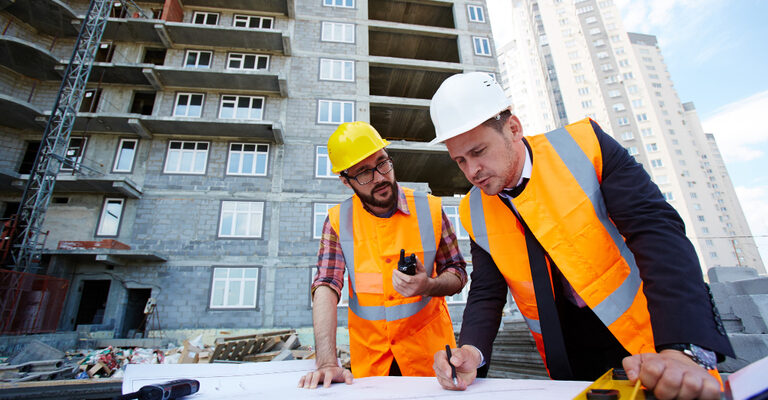Unless one is engaged in the building business, civil and commercial constructions may seem alike. After all, both have some building, planning, and engineering concepts in them. But they are practiced for rather different purposes and follow different working methodologies.
Being a business owner, interested in putting up a new development, or simply interested in knowing how our cities and communities are built, having an understanding of the difference is essential.
Here in this blog post, we will try to get at the meaning behind civil construction and commercial construction and point out the difference between them, as well as argue to look at why both are crucial in shaping the spaces in which we live and work.
What Is Civil Construction?
Civil construction is a subdomain of civil engineering that deals with designing, constructing, and maintaining the infrastructure that serves public interest directly. Such works, especially involving large-scale public works, are often government-funded or associated with major organizations.
There are many projects under civil construction:
- Roads, highways, and bridges
- Railways, tunnels, and airports
- Water treatment plants and sewage systems
- Dams, reservoirs, and power plants
- Public parks and utility pipelines
These projects sustain entire communities. Civil construction gives importance to strength, environment friendliness, and governmental stringent regulations. Civil projects have been made for the public for many decades, thereby demanding very careful planning, sustainability checks, and engineering at its best.
What Is Commercial Construction?
Therefore, commercial sites refer to private sector jobs. A business or institution that generates income or provides a service to an individual is a commercial project. They lack adequate public funding and are driven by business motives.
These are some commercial construction projects:
- Office buildings and corporate headquarters
- Shopping complexes, malls, and retail outlets
- Hotels, restaurants, and entertainment halls
- Warehouse and industrial complexes
- Hospitals, schools, and universities
- Apartments and residential towers
Lots of space in one room must be purposeful and safe, with design features that cater to business needs. Commercial contractors must team up with investors, business owners, and developers so that the project is completed within the timing and budget requirements. Those contractors manage subcontractors to comply with the building standards, including electricians, plumbers, and HVAC technicians.
Key Differences Between Civil and Commercial Construction
Yet, being under the umbrella term ‘construction’, their goals, designs, and oversight processes vary quite a bit.
1. Purpose and Use
Civil Construction: It aims at the realization of infrastructures for public use (highways, water schemes, and bridges, for instance).
Commercial Construction: The emphasis is on creating space for business, commerce, or services (offices, malls, and hospitals).
2. Sources of Funding
Civil Construction: Generally funded by governments or giant corporations.
Commercial Buildings: They are invested in by private entrepreneurs, developers, or investors.
3. Design and Infrastructure
Civil construction: It aims at durability, being environmentally friendly, and having a good effect on community welfare. Supporting infrastructure is often through dedicated systems to prevent disturbances during and after construction works have been carried out.
Commercial Building: Focuses on central systems such as heating, ventilation, and air conditioning, plumbing, and electric installations, which are services to the whole property, including tenants.
4. Oversight and Regulation
Civil Construction: Heavily regulated, influenced by politics, and subject to environmental assessment.
Commercial Construction: Zoning laws and building codes govern its development, but are arguably more focused on profitability and usability.
5. Project Scale
Civil Construction: Large-scale and long-term, affecting entire regions or cities.
Commercial Construction: Scales will vary, usually being customized for given businesses or organizations.
Why Both Are Important
While civil and commercial construction are entirely different in their nature of application, both are at the center of modern life. Civil projects make infrastructure working in the cities for sustainability; commercial projects deliver spaces for businesses to prosper and for communities to come together. One cannot exist in the way the other exists today.
Engage Experts in Civil Engineering!

Valdez Engineering will make sure that the communities develop with innovative and reliable engineering solutions. Be it designing infrastructure, planning environmentally viable projects, or providing engineering solutions that conform to regulatory standards, the team works towards developing systems that are sustainable. If you are planning a civil project or require expert advice, please allow us to help you bring your civil engineering vision into reality.
Final Thoughts
The next time you are driving on a highway or be it visiting a shopping center or via a public park, you shall know what distinguishes civil construction from commercial construction. While civil projects provide the basic infrastructure backbone for our communities, commercial projects provide the spaces where business and services prosper.
Both are very important for society today, and knowing the differences would increase our appreciation of how complicated and important the construction industry is.

